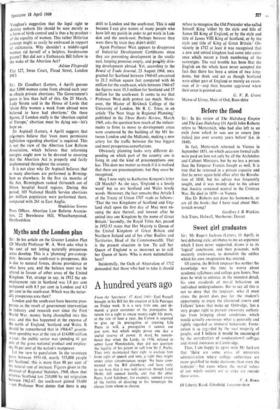Myths and the London plan
Sir: In his article on the Greater London Plan (28 March) Professor W. A. West asks what is the cost of not letting naturally prosperous areas develop. This is a 'planning' pre-concep- tion: because the south-east is prosperous, this is due to natural forces, divine providence or what have you, and the balance must not be altered in favour of other areas of the United Kingdom. Yet, strange to say, in 1912 the un-• employment rate in Scotland was 1.8 per cent compared with 8.5 per cent in London and 4.5 per cent in the south-east. Which was the natur- ally prosperous area then?
London and the south-east have become pros- perous as the result of government intervention in industry and research ever since the First World War, money being channelled into this area and -this has happened at the expense of the north of England, Scotland and Wales. It should be remembered that in 1966-67 govern- ment spending was at the rate of £14,000 million a year; the public sector was spending 41 per cent of the gross national product and employ- ing 30 per cent of the nation's manpower.
Let me turn to population. In the seventeen years between 1951-68, nearly 555,000 people left Scotland; this is more than 80 per cent of' the natural rate of increase. Figures given in the Abstract -of Regional Statistics, 1968, show that whereas Scotland lost 210,000 by net migration between 1962-67, the south-east gained 53,000 —yet Professor West denies that there is any
drift to London and the south-east. This is odd because I can give names of many people who have left my parish in order to get work in Lon- don and the south-east. Perhaps because they went there by train they didn't drift!
Again Professor West appears to disapprove of Industrial Development Certificates since they are preventing development in the south- east, keeping premises empty, and possibly driv- ing development abroad. Yet, according to the Board of Trade Journal, 23 August 1968, IDCS granted for Scotland between 1960-63 amounted to 21.2 million square feet compared with 66 million for the south-east, while between 1966-67 the figures were 35.3 million for Scotland and 57 million for the south-east. It seems to me that Professor West doth protest too much. More- over, the Master of Birkbeck College of the University of London, Mr R. C. Tress, in an article 'The Next Stage in Regional Planning,' published in the Three Banks Review. March 1969, asks the question how much of the induce- ments to firms to move to development areas were countered by the building of the M 1 be- tween London and the Midlands, making a new artery for the traffic between the two biggest and most prosperous conurbations.
Obviously planning looks very different de- pending on which part of the country one is living in and the kind of preconceptions one has. This does not matter so much if it is realised that there are preconceptions; but they must be recognised.
May I now reply to Katharine Kenyon's letter (28 March)? As she says, 'England is a lovely word' but so are Scotland and Wales lovely words. Moreover, the fact remains that Article I of the Treaty of Union 1707 reads as follows: 'That the two Kingdoms of Scotland and Eng- land shall upon the first day of May next en- suing the date thereof, and forever after be united into one Kingdom by the name of Great Britain.' Secondly, the Royal Titles Act, passed in 1952-53 states that Her Majesty is Queen of the United Kingdom of Great Britain and Northern Ireland and of her other Realms and Territories, Head of the Commonwealth. That is the present situation in law. To call her Queen of England is as incorrect as to call her Queen of Scots. Who is more nationalistic here?
Incidentally, the Oath of Abjuration of 1712 demanded that those who had to take it should
refuse to recognise the Old Pretender who called himself King 'either by the style and title of James III King of England, or by the style and title of James VIII King of Scotland, or by the style and title of King of Great Britain.' Ob- viously in 1712 at least it was recognised that a new and united kingdom had come into exist- ence whici meant a fresh numbering of the sovereigns. The real trouble has been that the English on the whole have never accepted the fact that there has been a union of two king- doms, but think and act as though Scotland were either part of England or merely an exten- sion of it—and then become aggrieved when their error is pointed out.










































 Previous page
Previous page